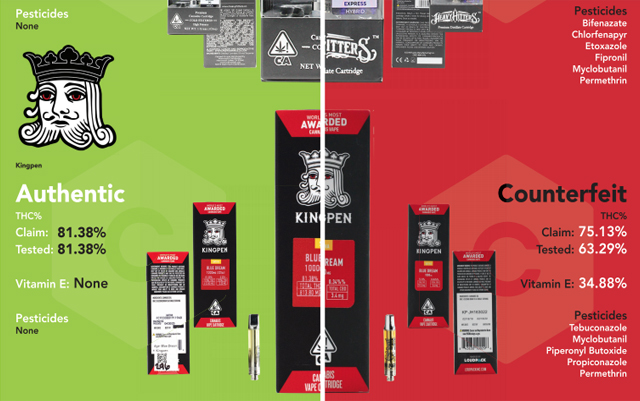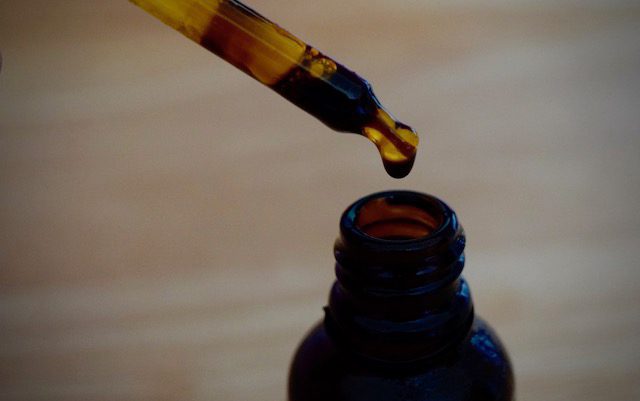Two leading cannabis testing companies in California are reporting that analysis of a total of 200 different vape devices sold through that state’s dispensaries and other licensed sources turned up no traces of the two principal agents suspected of playing a role in the vaping illness epidemic.
The leading suspects – commonly found in illegal or black market vape products – are vitamin E acetate, a thick oil normally used in skin products; and myclobutanil, a fungicide which, when heated above 400 degrees fahrenheit, produces fumes of lung-scorching hydrogen cyanide.
According to Josh Wurzer, president and co-founder of Santa Cruz-based SC Laboratories, failure rates for cannabis products tested in his lab have fallen from about 70 percent in 2017 – just prior to legalization of recreational use in California – to just 2 percent today. He told The Marijuana Times, “The number one factor we saw before legalization was myclobutanil. Was it making people sick then? Probably.”
The difference between then and this summer’s sudden outbreak of lung illness may be the “green rush” this spring. Long-time growers in California’s Emerald Triangle reported a number of new farms – or grows, in industry parlance – popping up. Many were started by inexperienced cultivators hoping to hit the jackpot that experts and industry leaders were predicting for this year’s crop. Mold and mildew can render an entire grow worthless so, whether due to ignorance or temptation, myclobutanil use likely spiked.
Wurzer said his lab has tested the contents of more than a hundred branded vape cartridges available for sale in California – and all passed the state standards for the absence of some 60-plus potential contaminants. Batches that fail are required to be reported to state officials, so he says legitimate producers and marketers tend to police their supply chains.
LA-based CannaSafe, believed to be the largest lab in the industry, also tested more than a hundred commercial vape cartridges, with similar results. The lab was commissioned by NBC News to go a step further and test about a dozen cartridges obtained from the black market. The results were widely reported the week before last – every single one was contaminated. All contained myclobutanil, which is considered so dangerous for use on marijuana that it is specifically banned in Canada, and in the states of Washington, Oregon, and Colorado.
“I was somewhat disappointed about the results,” says Aaron Riley, CannaSafe’s founder and president. He’d held out hope that some illegal grower somewhere had a conscience and the wisdom to grow clean weed. “I had hoped we would find products that weren’t completely contaminated, but we didn’t.”
Riley said the 104 legal vape products his company tested contained no vitamin E acetate or myclobutanil. They also met the label claims for the percentage of THC.
Cannasafe produced a 13-page slide deck that includes a side-by-side comparison of findings of tests on a popular brand of vape cartridge – Kingpen – obtained from a dispensary, next to the stats for a counterfeit Kingpen obtained on the black market. The contrast is stark and tells the whole story in a glance. Riley says all that testing proves that the regulated market makes it hard for illicit contaminated products to end up on retailer’s shelves.

While the immediate danger of inhaling cyanide is clear, the role of vitamin E acetate is less so. It, too, showed up suddenly this spring, widely used in the black market to dilute cannabis oil. According to Wurzer of SC Labs, vitamin E acetate is not meant to be vaped like the carrier oils used in legit vapes. It is heavy and when the heated molecules hit the lungs they adhere and block the exchange of oxygen.
Some experts are skeptical that vitamin E is the prime culprit in the sudden outbreak of vaping illness, but it’s still considered by California to be a significant contaminant.
At CannaSafe, Riley worries that there may be another health crisis lurking in the explosive growth in CBD products, which are derived from hemp. Although hemp has little or no psychoactive effect like weed, it is a plant prone to mold and mildew. But there are no regulations or rules requiring the sort of safety testing that THC has to go through to get to the legit market.
CBD products are sold just about everywhere. You can buy them online. “And nobody knows what’s really in them. It’s the Wild West,” he says. “Vitamin E acetate is the first dangerous additive in the illicit market to make headlines, but it may not be the last.”






